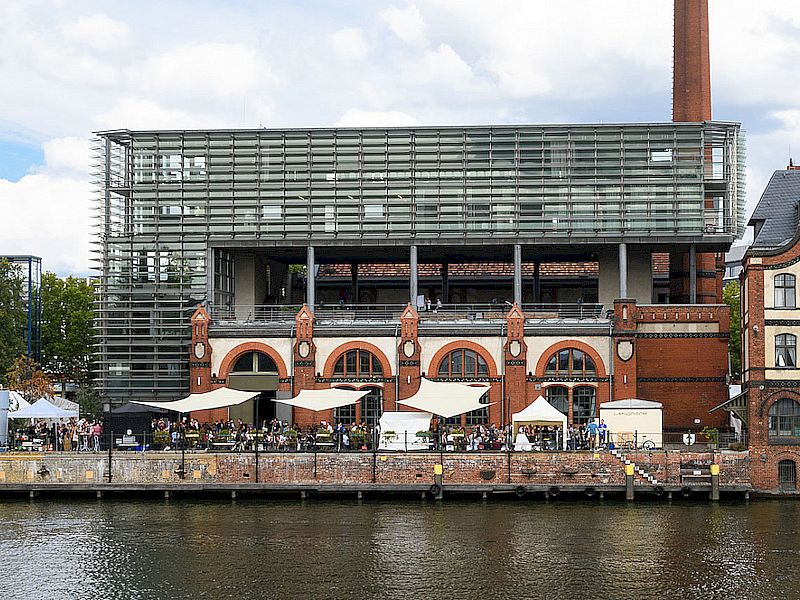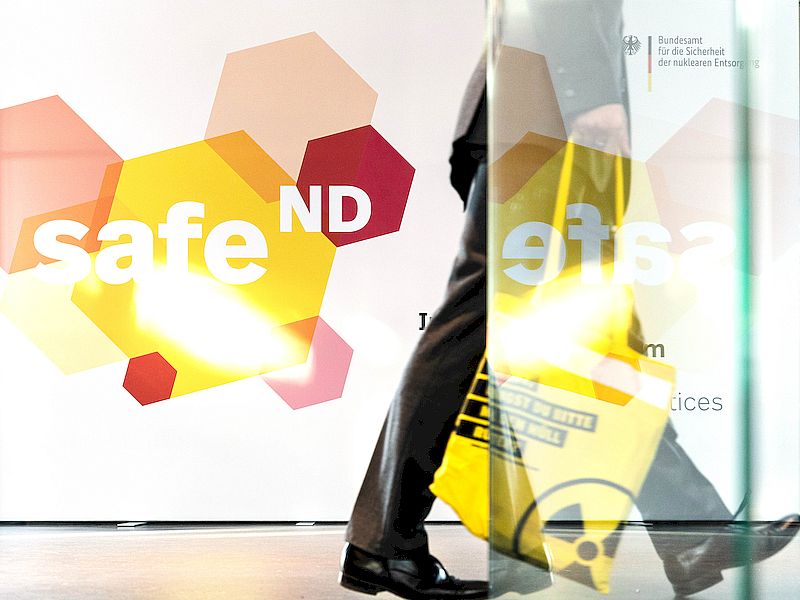safeND 2025: The third BASE research symposium
The Federal Office for the Safety of Nuclear Waste Management (BASE) invites you to the third meeting of the Interdisciplinary Research Symposium on the Safety of Nuclear Disposal Practices (safeND 2025).

Time as a safety factor: opportunities and challenges of timely nuclear waste disposal
The Federal Office for the Safety of Nuclear Waste Management (BASE) invites you to the third Interdisciplinary Research Symposium on the Safety of Nuclear Disposal Practices (safeND 2025).
The biennial safeND addresses all issues relating to the safety of nuclear waste disposal. SafeND 2025 will take place in Berlin from 17 to 19 September and focus on the main topic: "Time as a safety factor: opportunities and challenges of timely nuclear waste disposal".
Developing and implementing disposal concepts for nuclear waste that ensure long-term safety is a complex sociotechnical challenge requiring, in particular, extensive geological exploration, engineering research, numerical simulation and long-term awareness preservation.
The technical vulnerabilities of such a waste disposal concept are not the only dangers to society, however. It’s essential that a timely implementation also is accounted for as a central safety factor. The imperative nature of timing as a safety factor derives not only from the fact that the radioactivity of nuclear waste is currently at its highest level and will decay over time, but also from the fact that high-level radioactive waste is currently stored above ground in most parts of the world.
Such above-ground storage makes this waste vulnerable to various geopolitical threats, including military conflicts, radical alterations to existing political institutions and to consequences of climate change. So how can we properly account for the factor of time when evaluating the safety of nuclear disposal programmes?
The symposium will include lecture and poster sessions as well as workshops and panel discussions.
Date
safeND 2025 will take place in Berlin from 17 to 19 September 2025.
Call for Sessions: 27/08/2024 to 05/11/2024
Call for Contributions: 06/01/2025 to 31/03/2025
Venue

safeND 2025 will take place at Radialsystem in Berlin, Germany (Holzmarktstraße 33, 10243 Berlin).
This former pumping station is now a versatile cultural and event centre on the banks of the river Spree in Berlin.
Useful information for traveling to Berlin can be found at visitberlin.
About the symposium
safeND stands for "Interdisciplinary Research Symposium on the Safety of Nuclear Disposal Practices". Scientists are given the opportunity to present their current research results and projects in intra- and interdisciplinary discussions. The following topics, among others, will be addressed:
- Decommissioning of nuclear facilities
- Storage, conditioning and transport of radioactive waste
- Site selection and deep geological disposal of radioactive waste
- Alternative disposal methods
- Public participation and communication
- Nuclear safety culture and knowledge preservation
- Social sciences and humanities perspectives on nuclear energy and radioactive waste (including historical, economic and legal analyses)
- Safeguards and non-proliferation in nuclear waste disposal
- Nuclear waste management related to alternative reactor designs and fusion energy
Call for Contributions
The Call for Contributions began on January, 6 2025. You are kindly invited to submit proposals for the following formats:
- Oral: A 15-minute presentation, followed by 5 minutes for questions from the audience
- Poster: Exhibition of an A0 poster and a 2-hour poster presentation
- Panel discussion: A panel discussion organized by you (approx. 1-2 hours)
- Workshop: A workshop organized by you (approx. 2-3 hours)
Use the following links to submit your proposals for orals and posters and proposals for panel discussions and workshops.
Please also indicate which of the proposed sessions you would like to assign your proposal to.
Please note: The Call for Contributions closes on March 31, 2025.
Scientific Committee

A scientific committee advises BASE on the selection of submissions from the Call for Contributions and on the compilation of the program. The members of the scientific committee are:
- Dr. Carla-Olivia Krauß, Institute of Technology and Management in Construction, Karlsruhe Institute of Technology (KIT), Germany
- Dr. Petra Tjitske Kalshoven, Department of Social Anthropology, University of Manchester, UK
- Dr. Florence-Nathalie Sentuc, Gesellschaft für Anlagen- und Reaktorsicherheit (GRS) gGmbH, Germany
- Dr. Holger Völzke, Safety of Storage Containers Division, Bundesanstalt für Materialforschung und -prüfung (BAM), Germany
- Prof. Dr. Barbara Reichert, Institute for Geosciences, University of Bonn, Germany; Chair of Nuclear Waste Management Commission (ESK), Germany
- Dr. Jens Birkholzer, Energy Geosciences Division, Lawrence Berkeley National Laboratory, USA
- Dr. Tim Vietor, Safety, Geology & Radioactive Materials Division, National Cooperative for the Disposal of Radioactive Waste (NAGRA), Switzerland
- Dr. Bo Strömberg, Unit for plant safety assessment, Swedish Radiation Safety Authority (SSM), Sweden
- Prof. Dr. Ulrike Felt, Department of Science and Technology Studies, University of Vienna, Austria
- Dr. Catrinel Turcanu, Science, Technology and Society, Belgian Nuclear Research Centre (SCK CEN), Belgium
- Prof. Dr. Anna Storm, Department of Thematic Studies, Linköping University, Sweden
- Dr. Luca Abele Piciaccia, Norwegian Radiation and Nuclear Safety Authority (DSA), Norway
- Dr. Markku Lehtonen, Department of Humanities, University Pompeu Fabra Barcelona, Spain
- Prof. Susan Molyneux-Hodgson, Department of Sociology, Philosophy and Anthropology, University of Exeter, UK
- Prof. Dr. Dörte Fouquet, Sustainability Law – Energy, Resources, Environment, Leuphana University Lüneburg, Germany
- Dr. Nikolaus Müllner, Institute of Safety and Risk Sciences, University of Natural Resources and Life Sciences (BOKU), Vienna
- Prof. Allison M. Macfarlane, School of Public Policy and Global Affairs, The University of British Columbia, Vancouver
Registration for safeND 2025
Registration for attendance is independent of participation in the Call for Sessions or the Call for Contributions. The registration for attendance is expected to open in spring 2025. The participation fee is 450 euros (225 euros reduced).
If you have any questions about the symposium, please contact us at the following e-mail address:
Stand: 2025.02.13

